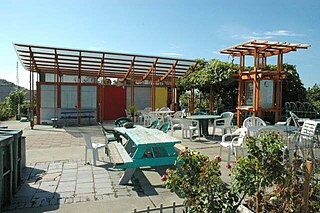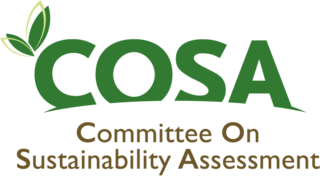Related Research Articles

Urban agriculture,urban farming, or urban gardening is the practice of cultivating, processing, and distributing food in or around urban areas. It encompasses a complex and diverse mix of food production activities, including fisheries and forestry, in cities in both developed and developing countries. The term also applies to urban area activities of animal husbandry, aquaculture, beekeeping, and horticulture. These activities occur in peri-urban areas as well, although peri-urban agriculture may have different characteristics.
Governance is the process of interactions through the laws, norms, power or language of an organized society over a social system. It is done by the government of a state, by a market, or by a network. It is the decision-making among the actors involved in a collective problem that leads to the creation, reinforcement, or reproduction of social norms and institutions". In lay terms, it could be described as the political processes that exist in and between formal institutions.
Supportive housing is a combination of housing and services intended as a cost-effective way to help people live more stable, productive lives, and is an active "community services and funding" stream across the United States. It was developed by different professional academics and US governmental departments that supported housing. Supportive housing is widely believed to work well for those who face the most complex challenges—individuals and families confronted with homelessness and who also have very low incomes and/or serious, persistent issues that may include substance use disorders, mental health, HIV/AIDS, chronic illness, diverse disabilities or other serious challenges to stable housing.

West Oakland is a neighborhood situated in the northwestern corner of Oakland, California, United States, situated west of Downtown Oakland, south of Emeryville, and north of Alameda. The neighborhood is located along the waterfront at the Port of Oakland and at the eastern end of the San Francisco–Oakland Bay Bridge. It lies at an elevation of 13 feet.

A community garden is a piece of land gardened or cultivated by a group of people individually or collectively. Normally in community gardens, the land is divided into individual plots. Each individual gardener is responsible for their own plot and the yielding or the production of which belongs to the individual. In collective gardens the piece of land is not divided. A group of people cultivate it together and the harvest belongs to all participants. Around the world, community gardens exist in various forms, it can be located in the proximity of neighborhoods or on balconies and rooftops. Its size can vary greatly from one to another.

Engineers for a Sustainable World (ESW) is a not-for-profit network headquartered in Pittsburgh, PA, USA. ESW is an umbrella organization with chapters established at over 50 colleges, universities, and city chapters located primarily in the United States and Canada ESW members work on technical design projects that have a focus on sustainability and environmental issues. Projects can be located either on-campus, in the local community, or internationally. Chapters are made up of students or professionals and are semi-autonomous.

The term "sustainable communities" has various definitions, but in essence refers to communities planned, built, or modified to promote sustainable living. Sustainable communities tend to focus on environmental and economic sustainability, urban infrastructure, social equity, and municipal government. The term is sometimes used synonymously with "green cities," "eco-communities," "livable cities" and "sustainable cities."
Community economic development (CED) is a field of study that actively elicits community involvement when working with government, and private sectors to build strong communities, industries, and markets. It includes collaborative and participatory involvement of community dwellers in every area of development that affects their standard of living.

Interbay P-Patch, "The Garden Between The Bays", is one of Seattle, Washington's largest and most involved community gardens, and is recognized as an example of resourcefulness and sustainability.

Urban horticulture is the science and study of the growing plants in an urban environment. It focuses on the functional use of horticulture so as to maintain and improve the surrounding urban area. Urban horticulture has seen an increase in attention with the global trend of urbanization and works to study the harvest, aesthetic, architectural, recreational and psychological purposes and effects of plants in urban environments.
Denver Urban Gardens (DUG) is a non-profit organization that supports community gardens in Denver, Colorado in the United States.
BREEAM, first published by the Building Research Establishment (BRE) in 1990, is the world's longest established method of assessing, rating, and certifying the sustainability of buildings. More than 550,000 buildings have been 'BREEAM-certified' and over two million are registered for certification in more than 50 countries worldwide. BREEAM also has a tool which focuses on neighbourhood development.
Community indicators are "measurements that provide information about past and current trends and assist planners and community leaders in making decisions that affect future outcomes". They provide insight into the overall direction of a community: whether it is improving, declining, or staying the same, or is some mix of all three.
Garden sharing or urban horticulture sharing is a local food and urban farming arrangement where a landowner allows a gardener access to land, typically a front or back yard, in order to grow food.
Media development involves capacity building for institutions or individuals related to freedom of expression, pluralism and diversity of media, as well as transparency of media ownership. Media development plays a role in democracy and effective democratic discourse through supporting free and independent media.
A sustainability organization is (1) an organized group of people that aims to advance sustainability and/or (2) those actions of organizing something sustainably. Unlike many business organizations, sustainability organizations are not limited to implementing sustainability strategies which provide them with economic and cultural benefits attained through environmental responsibility. For sustainability organizations, sustainability can also be an end in itself without further justifications.

The Committee on Sustainability Assessment (COSA) is a global consortium of development institutions that work collaboratively to advance sustainability learning with its systematic and science-based measurement. COSA applies a pragmatic and collective approach for using scientific methods to develop indicators, tools, and technologies to measure the distinct social, environmental, and economic impacts and are applied in performance monitoring, evaluation, ROI calculation, and impact assessment. COSA has a public mission to open its scientific methods and metrics up to widespread use.

Community gardens in the United States benefit both gardeners and society at large. Community gardens provide fresh produce to gardeners and their friends and neighbors. They provide a place of connection to nature and to other people. In a wider sense, community gardens provide green space, a habitat for insects and animals, sites for gardening education, and beautification of the local area. Community gardens provide access to land to those who otherwise could not have a garden, such as apartment-dwellers, the elderly, and the homeless. Many gardens resemble European allotment gardens, with plots or boxes where individuals and families can grow vegetables and flowers, including a number which began as victory gardens during World War II. Other gardens are worked as community farms with no individual plots at all, similar to urban farms.

Circles of Sustainability is a method for understanding and assessing sustainability, and for project management directed towards socially sustainable outcomes. It is intended to handle 'seemingly intractable problems' such as outlined in sustainable development debates. The method is mostly used for cities and urban settlements.
Gateway Greening is non-profit organization based in St. Louis, Missouri that works to educate and empower the community through gardening and urban agriculture. The organization operates demonstration and community resource gardens and an urban farm, hosts lectures and education programs, and supports school and community gardens throughout the City and St Louis County, Missouri.
References
- ↑ Holden, Meg (2006). "Sustainable Seattle: The Case of the Prototype Sustainability Indicators Project". Community Quality-of-Life Indicators. Social Indicators Research Series. Vol. 28. Springer, Dordrecht. pp. 177–201. doi:10.1007/978-1-4020-4625-4_7. ISBN 9781402046247.
- ↑ "Sustainable Seattle". Community Indicators Consortium. 2017-08-23. Retrieved 2022-05-14.